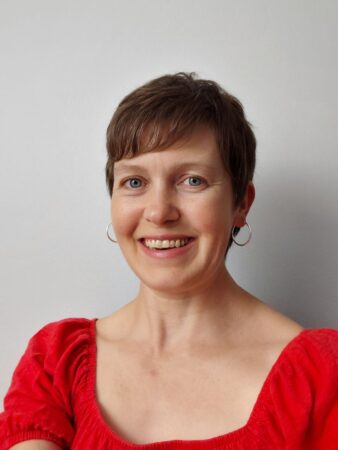Pentecost is a lively feast. It abounds with stories and symbols of the mysterious, sometimes mischievious Spirit of God at work among people, nonhuman creatures, and nonliving elements. It’s a day on which Christians celebrate the God who is “do[ing] a new thing” in our midst, to echo the prophet Isaiah (43:19, NRSVUE), with more energy, creativity, and vitality than we can comprehend.
There is no shortage of ways for Christians to explore together the meaning of Pentecost and God’s presence in the Holy Spirit. In this article, I want to highlight one empowering avenue for Pentecost formation with people of all ages that is inspired by Acts 2 and Cole Arthur Riley’s “Pentecost” reflection in “Black Liturgies”: finding your voice.
A Spirit and People Who Won’t Be Silenced
The scene in Acts 2 is vivid and astounding. The Spirit of God suddenly shows up in the house where the disciples have gathered. They all begin speaking in diverse languages, and they start attracting a crowd of Jewish people from different occupied places across the Roman Empire who are all currently in Jerusalem. Members of the crowd are shocked to realize that they understand what the disciples are saying, and what they hear is a message about “God’s deeds of power” (Acts 2:11, NRSVUE).
I find several facets of this story theologically striking:
1. The Spirit Gives People Voices
The coming of the divine Spirit that Jesus promises in Acts 1:8 goes to work among the disciples and the wider community in the city by enabling people to speak up. Instead of a voice from heaven like we witness in the gospel accounts of Jesus’s baptism and transfiguration, God chooses here to fill all these disciples and to empower them to use their voices to tell the story of what God has been doing.
2. The Spirit Seeks Disempowered, Subjugated People
A crucial point that Riley makes in “Pentecost” is that the people who congregated near the disciples “heard themselves in the sound—not the language of their oppressors or people who believed themselves to be closer to the divine than others” (264). The languages that the Spirit enables the disciples to speak are not the official imperial languages. They are the languages of the people whose lands and economies have been conquered by Rome.
What is more, languages contain more than words. As theologian Willie James Jennings points out in his commentary on Acts, they bear the histories, cultures, relationships, and wisdom of the people who shape them (28–30). In propelling the disciples toward the languages of other subjugated people, God’s Spirit embraces the very lives of these subjugated people in Jerusalem. As Jennings says, “Speak a language, speak a people. God speaks people, fluently. And God, with all the urgency that is with the Holy Spirit, wants the disciples of [God’s] only begotten Son to speak people fluently too. This is the beginning of a revolution that the Spirit performs” (30).
3. The Spirit Invites People to Resist Oppression
In choosing people’s native languages over the imperial languages, the Spirit shows the word that God has for disempowered, subjugated people to run counter to the Roman Empire’s words of oppression. Riley illuminates the social and political significance of the Spirit’s movement with this statement: “Pentecost reminds us that the Spirit of God rejects assimilation under the guise of ‘unity.’ This tale is not just about diversity; it’s not mere tokenism; it’s language as liberation. It’s the sound of excluded voices making something whole again” (264–265).
The Pentecost story is about a Spirit and people who won’t be silenced. In this feast, we witness God meeting oppressed people where they are in ways that affirm who they are. We encounter God lifting up their voices and inviting people to speak up and speak out in their own words. We find God working to liberate disempowered people.
This work of the Spirit is still relevant and vital for Christian communities today. Oppressive systems are still with us, striving to deprive people of voices and impose language that deceives, exploits, and wounds. We need the Spirit to do what the Spirit does best: to shake things up, to let more air into the room, and to inspire people to reclaim their voices and their lives as bearers of God’s image and participants in God’s liberation story.
Formation Ideas
Here are three ways of creating space for members of your communities to find and express their voices on Pentecost and in subsequent weeks. I use “voice” here expansively to include various means and modes of self-expression and communication—not solely oral communication. These activities can be incorporated into a formation lesson or serve as the focal point of a formation gathering.
1. Listening Prayer
Cole Arthur Riley offers the following breath prayer practice at the end of her “Pentecost” reflection. It is a simple and powerful prayer that you can pray with a group, silently or aloud, as you breathe together for as short or as long of a period as you wish. Please credit Riley when using or sharing.
“INHALE: I won’t forget myself.
EXHALE: I will listen for my voice.”
From “Pentecost” in “Black Liturgies” by Cole Arthur Riley (266)
2. Storytelling
Invite members to share their personal stories with one another. This can be done in many different ways and tailored to your community’s gifts, needs, and interests. What is important is to make the space inclusive and safe for each person to find and offer their own voice as well as to be heard. Two resources that provide helpful guidance on cultivating attentive sharing and listening group spaces are the Episcopal Church’s “Beloved Community Story Sharing Guidebook,” which includes numerous planning ideas and recommendations, and Coming to the Table’s “Touchstones” for respectful group interactions.
Some ways you might shape this activity include:
- Sharing aloud in pairs or taking turns to share around a group circle
- Taking time to write stories down first and then giving members a chance to share what they’ve written
- Providing a specific prompt to inspire their stories, like . . .
- Talk about a time when you felt seen or heard by God
- Tell a story about one thing that gives you joy and why
- Talk about a time when you learned something about yourself that was or is important to you
- (From the Beloved Community Story Sharing Guidebook linked above, which contains more prompts): “Share a story about a time when you felt left out, like your voice and presence did not matter”
3. Speaking Truth to Power
Invite members to use their voices to respond to a form of systemic injustice or oppression that is impacting your wider community or local context. Here are a few suggestions to inspire your discernment:
- Get involved in a local organization or coalition working for social and ecological justice and add your voices in solidarity with those of your neighbors
- Share stories, poems, or songs of resistance against oppression that reaffirm human dignity and creation’s sanctity
- If your group or community enjoys getting creative, consider speaking up and speaking out by making and sharing prophetic art; this can look like drawing flyers or posters, creating a mural, writing and printing a zine, and much more
A Final Note
Finding our voices can be a fun and exciting adventure. It can also be challenging, depending on our social locations and the kinds of narratives we have received about who we are and what we have to say.
When we as Christians, living in and with the Holy Spirit, hold space for one another, our neighbors, and ourselves to discern and speak the truths of our lives, we are doing something that can change everything. That space is a Pentecost space. That space means room for liberation.
References
Jennings, Willie James. “Acts.” Belief: A Theological Commentary on the Bible Series. Louisville: Westminster John Knox, 2017.
Riley, Cole Arthur. “Pentecost.” In “Black Liturgies: Prayers, Poems, and Meditations for Staying Human.” New York: Convergent, 2024. 264–66.
Featured image is by Fotocitizen on Pixabay


 Jodi Belcher is the Lead Editor of Building Faith. She is a writer, educator, and lay Episcopalian. Before becoming editor, she earned her Th.D. in theology at Duke Divinity School, taught in higher education, and directed Christian formation for all ages at an Episcopal parish. She currently lives in Durham, North Carolina with her family of five plus two cats.
Jodi Belcher is the Lead Editor of Building Faith. She is a writer, educator, and lay Episcopalian. Before becoming editor, she earned her Th.D. in theology at Duke Divinity School, taught in higher education, and directed Christian formation for all ages at an Episcopal parish. She currently lives in Durham, North Carolina with her family of five plus two cats.